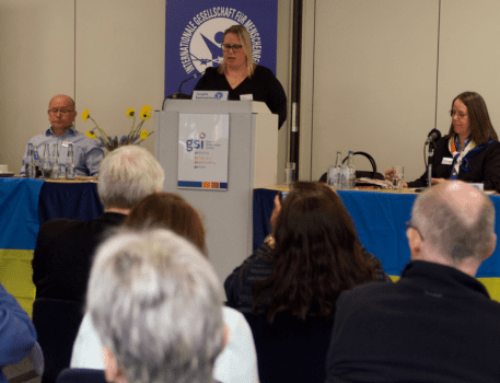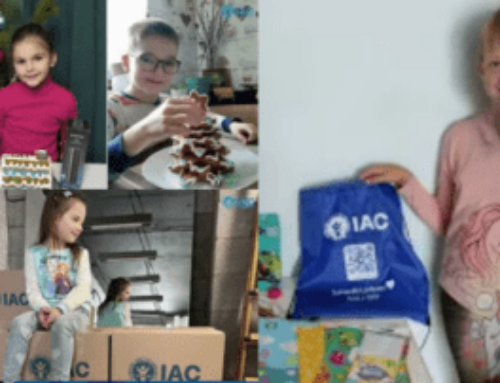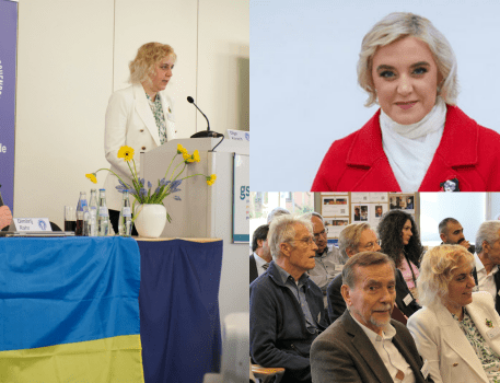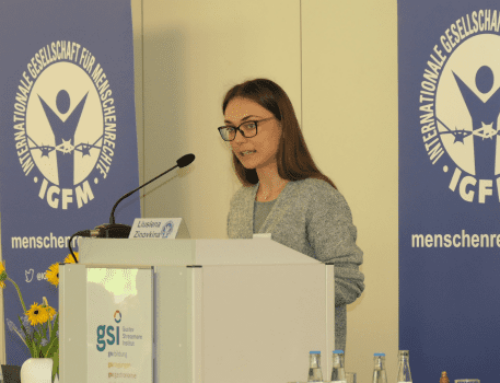
A small country with a big heart
Presentation from 20.04.2024, Bonn
This is the German transcript. You can find the video recording on our YouTube channel as well as linked in this article.
Moldova is one of the countries most affected by Russia’s illegal invasion of Ukraine. At the beginning of the large-scale Russian invasion of Ukraine, Moldova became the leading country in the number of Ukrainian refugees received per capita. The geographical location, a weak government, and insufficient energy resources make Moldova a very vulnerable country.
Average Moldovans watch the events in Ukraine with horror and project them onto themselves and their small country on the border with Ukraine. They live under constant stress: every destroyed bridge, every conquered town or village increases their fear. Precisely because Moldova is neither a member of the European Union nor NATO, it is worried about its future. The presence of Russian forces in Transnistria, where around 500,000 people live, is a constant cause for concern in Moldova. Kiev believes that Russia wants to use this area for attacks on Ukraine.
Around 20,000 tonnes of weapons and ammunition from the Soviet era are stored in Transnistria. The risk of an accidental explosion in Kolbasna has increased as a result of military action in Ukraine. There are fears that the warehouse could be blown up – whether accidentally by a stray missile or deliberately as a result of sabotage by Ukraine or Russia. Experts believe that the explosion could be as powerful as the bomb on Hiroshima.

The geographical location of Moldova
The VII Congress of Deputies in Transnistria
The international community was very interested when rumours emerged in the media about the intention of the VII Congress of Deputies in Transnistria to ask for the region to be incorporated into Russia. Pro-Russian separatists from Transnistria had apparently previously appealed to Moscow for help. This was reminiscent of the developments in eastern Ukraine shortly before the invasion of Russian troops. The prediction that Congress would ask to become part of Russia did not materialise. Congress called on Russia to take “diplomatic measures for protection”. But Moscow reacted cautiously. The Congress considered it necessary to appeal not only to the Russians, but also to the UN Secretary General, participants in the negotiations in the “5+2” format (EU, OSCE, Russia, USA and Ukraine + Transnistria and Moldova), OSCE, Inter-Parliamentary Assembly of the CIS, the European Parliament and the International Committee of the Red Cross.
While Europe argues and is divided, Russia continues to escalate. Putin wants more and has his eye on Moldova. Destabilising actions can become a real target for separatists. There is a railway corridor through which Ukrainian grain can be transported. This is particularly important for Kiev if Ukraine’s borders with Hungary, Poland and Slovakia are closed. But it should not be concealed that the Republic of Moldova benefits from the risks. It is no secret that Moldova was granted EU candidate status mainly because of Russia’s military aggression against our neighbouring and friendly Ukraine.
The Transnistrian section of the Moldovan-Ukrainian border is closed. Since the beginning of the war, the Transnistrian region can only export through territories controlled by Moldova’s constitutional authorities. More than 70 per cent of the Transnistrian region’s exports therefore go mainly to the EU. The flows are in the hands of Chisinau and the European Union, which supports it.
A small country with a big heart
The help for refugees, the hospitality and the willingness of Moldovan citizens to help war refugees has changed Moldova’s image. Instead of being labelled as “the poorest”, it is now called “a small country with a big heart”. More than 900,000 people seeking protection have travelled to Moldova since the beginning of the war. More than 100,000 people are currently there, and around 22,000 of them have been granted “temporary protection”, which enables them to receive financial support or helps them to find a job without having to apply for refugee status. The temporary protection scheme was introduced on 1 March 2023.

Human rights activist Dr Liubov Nemcinova at the 52nd annual conference of the IGFM in Bonn
Support for refugees
The Moldova section of the ISHR offers counselling for Ukrainian refugees to help them solve many problems. It turns out that the status of “temporary protection” for Ukrainian citizens is the cause of legal problems and bureaucratic hurdles. Internally displaced persons cannot take out their own health insurance, they cannot obtain a driving licence and have little prospect of being allowed to settle and live permanently in Moldova. All of these things could easily be corrected, but this would require optimisation of the legislation.
The IGFM Moldova section is campaigning for the normalisation of the rights of Ukrainian refugees. Since the first days of the war, the Moldova section has been providing humanitarian aid to Ukrainian refugees with the support of the German section. The Moldovan section has also organised sporting events for Ukrainian orphans to improve the emotional and psychological state of the children.
For me personally, Russia’s war against Ukraine is a great tragedy. I was born in Ukraine and consider myself Ukrainian. I spent my childhood in the Carpathian Mountains. Most of my life is connected with Moldova, which has become my second home. My mother’s grave is in Moldova, my father’s grave is in Ukraine, in the Sumy region. I have relatives who live in Russia and Ukraine.
I have dedicated 25 years of my life to human rights activities. For me, people, their rights and freedoms have the highest priority. In the last two years since the beginning of the war, I have reconsidered my view of human rights and I have come to the conclusion that resistance to war should be preserved as a right and included in the catalogue of universal ethical norms.








Leave A Comment